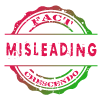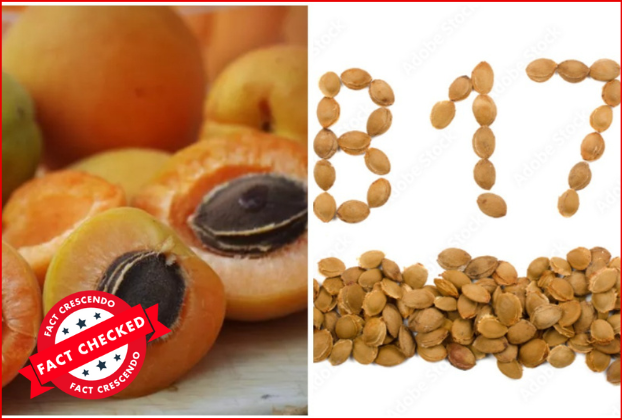Social media is often a breeding ground for various treatment methods for conditions such as cancer; however, many of these are misleading and without any scientific explanation. Yet, many social media users consume such unverified content widely. Let’s look at one such claim regarding the purported effectiveness of Vitamin B17 in killing off cancer cells.
Social Media Posts
Viral Facebook posts in Sri Lanka stated that Vitamin B17, found in apricots and some other types of seeds, kills cancer cells and can be considered a cancer treatment. This claim is shared alongside a newspaper clipping which highlights that “cancer is not a disease, but only a condition of Vitamin B17 deficiency”, as seen below.
The same claim was viral in among English users as well.
In TikTok, we also found videos discussing the benefits of B17 in different ways.
We decided to do a fact-check on this.
Fact Check
What is Vitamin B17?
Vitamin B17, also known as amygdalin or laetrile, is a compound found in the seeds of certain fruits, such as apricots, peaches, and bitter almonds. Despite its name, Vitamin B17 is not a vitamin and is not an essential nutrient for humans. The compound was reportedly first isolated in 1830 by two French chemists and belongs to a group of substances called cyanogenic glycosides, which can release cyanide when metabolised.
Does Vitamin B17 Kill Cancer Cells?
The claim that Vitamin B17 can kill cancer cells lacks reliable scientific backing. While some laboratory and animal studies have suggested potential anticancer properties of amygdalin, these findings have not been confirmed in clinical trials with humans. Some such research can be reached here, here, here and here.
Most studies have found no significant benefit from using amygdalin or laetrile as a cancer treatment. Some research has shown minimal effects on certain types of cancer cells, but these findings are not strong enough to support its use. Consequently, the U.S. Food and Drug Administration (FDA) has banned laetrile as a cancer treatment due to concerns over its safety and effectiveness.
Health Risks of Vitamin B17
A major risk associated with amygdalin is cyanide poisoning. When ingested, amygdalin can break down into hydrogen cyanide, a toxic substance. There have been reports of cyanide poisoning in individuals who consumed amygdalin, with symptoms ranging from nausea and vomiting to dizziness, headaches, and, in severe cases, coma and death.
Other serious side effects of amygdalin include low blood pressure (hypotension), liver damage, nerve damage leading to difficulty walking, fever, and potentially fatal outcomes. Given these significant risks and the lack of proven benefits, using amygdalin is considered dangerous, especially for cancer patients.
Cancer charities, including Cancer Council Australia, negatively view amygdalin, a chemical found in apricot kernels that are sometimes marketed as “Laetrile” or falsely labelled as “vitamin B17.” As per the Cancer Council, despite claims that Laetrile can cure cancer by releasing cyanide to kill cancer cells while sparing normal ones, decades of research have found no evidence supporting its effectiveness.
As per the Cancer Council, Clinical trials in animals and humans have consistently shown that Laetrile does not treat tumours, and its use can lead to cyanide poisoning, with several reported cases of death. Consequently, the sale of raw apricot kernels has been banned in Australia and New Zealand since December 2015 due to the significant health risks. Cancer Council web can be reached here.
Dr. Sarthak Moharir, Chief Radiation Oncologist at Apollo Cancer Centre, Bilaspur
While speaking with The Healthy Indian Project, Dr. Sarthak Moharir, Chief Radiation Oncologist at Apollo Cancer Centre, Bilaspur, has expressed strong concerns about the claims surrounding Vitamin B17 and its purported cancer-fighting abilities. He clarifies that this so-called Vitamin B17 is a misnomer, as it actually refers to Amygdalin or Laetrile, a compound found in apricot and bitter almond seeds.
Contrary to misleading claims, Amygdalin is not a vitamin but a cyanogen glycoside—a natural plant toxin that can break down into cyanide within the body. Dr. Moharir warns that consuming Amygdalin can lead to cyanide poisoning and, in severe cases, may even result in death. Therefore, he emphasizes that Laetrile/Amygdalin is not safe or beneficial for anyone, including cancer patients.
Follow us and stay up to date with our latest fact checks.
Facebook | Twitter | Instagram | Google News | TikTok
Conclusion
The claim that Vitamin B17 kills cancer cells and is banned due to its effectiveness is mostly false. While amygdalin has been marketed as an alternative cancer treatment, there is no reliable clinical evidence to support its efficacy. Moreover, its use poses significant health risks, including the potential for cyanide poisoning. For these reasons, amygdalin is not approved as a cancer treatment and is banned by regulatory agencies such as the FDA. It is crucial to rely on scientifically validated treatments and consult healthcare professionals when considering cancer treatment options.

Title:Does that Vitamin B17 (Amygdalin) Kill Cancer Cells?
Written By: Fact Crescendo TeamResult: Misleading






